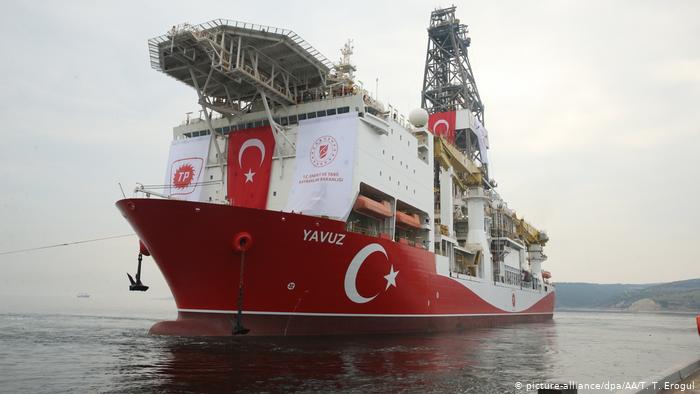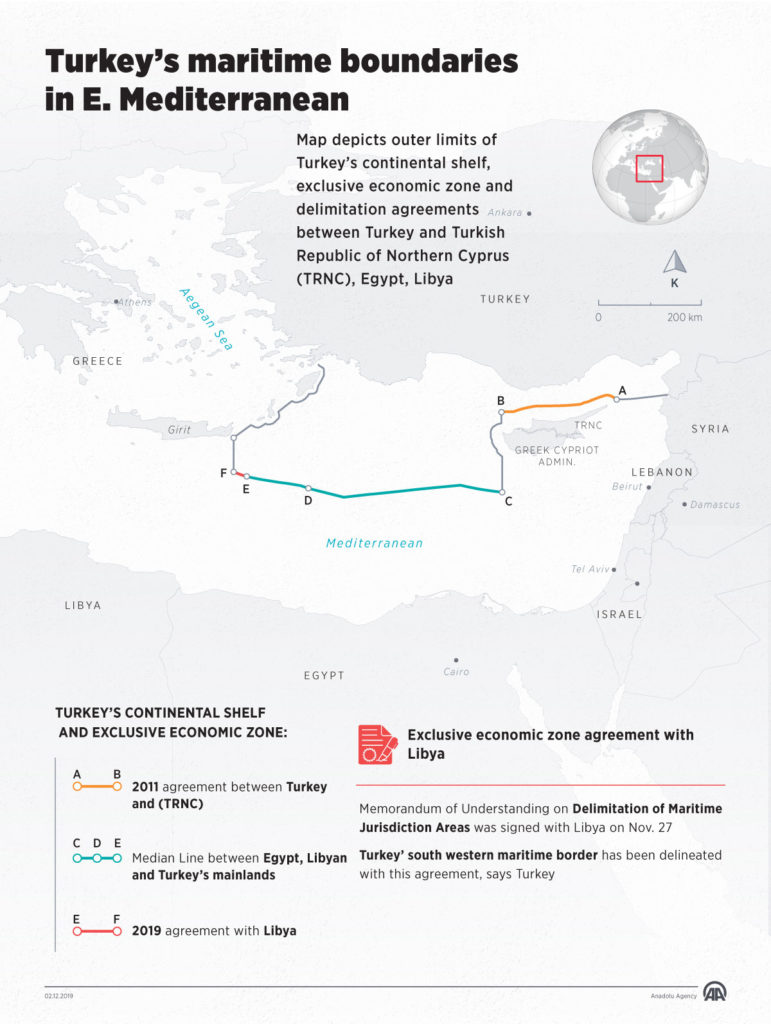On November 27th, Turkey and Libya’s Government of National Accord (the GNA that controls less than a half of the country) signed a memorandum on maritime boundaries in the Mediterranean Sea.
The two sides also signed a deal on expanded security and military cooperation. This was announced by Turkish Foreign Minister Mevlut Cavusoglu. The deals aim to “protect Turkey’s rights under international law” in the region of Mediterranean, the minister said.
Turkey had been unable to make such deals with some other countries in the region due to ongoing bilateral issues, but there was still hope according to Cavusoglu.
Turkey will sign agreements with those countries in the Mediterranean “if the grounds become suitable” in the future, he said, indirectly referring to Mediterranean countries such as Egypt and Greece.
“The Security and Military Cooperation” and “Restriction of Marine Jurisdictions” agreements were signed at a meeting in Istanbul on November 27th between Turkish President Tayyip Erdoğan and Fayez al-Serraj, the head of the Tripoli-based government which Ankara is backing against Field Marshal Khalifa Haftar’s Libyan National Army (LNA).
The (security) agreement establishes training and education, structures the legal framework and strengthens the ties between our militaries,” the Turkish presidency’s communications director, Fahrettin Altun said.
“We will also continue advocating for a political solution to build a democratic, stable and prosperous Libya,” he said.
https://twitter.com/fahrettinaltun/status/1199811324492034051
According to Altun, the two sides signed a memorandum of understanding on the “delimitation of maritime jurisdictions,” which aims to protect the two countries’ rights under international law.
On December 2nd, Omer Celik, spokesman for the Justice and Development (AK) party, which is the leading party in Turkey, said that the memorandums adhered to international law.
“The memorandum between Turkey and Libya on maritime jurisdiction in eastern Mediterranean complies with international law,” Omer Celik said.
Russian Foreign Ministry spokesperson Maria Zakharova said that Russia hadn’t familiarized itself with the contents of the documents, however it noted the “fairly painful reaction to this signing by a number of Mediterranean states, primarily, Greece, Cyprus and Egypt.”
Russia didn’t specifically condemn the agreements, but said that there were allegations that Turkey was trying to legitimize its military support of the GNA government in Libya and has been violating the arms embargo.
“In turn, the UN Secretary-General’s Special Representative for Libya, Ghassan Salame, recently suggested that the document could disrupt preparations for an international meeting on Libyan settlement scheduled to be held in Berlin later this year. This raises many questions directly for Mr Sarraj.”
Greek Foreign Minister Nikos Dendias said any maritime accord between Libya and Turkey “ignores something that is blatantly obvious, which is that between those two countries there is the large geographical land mass of Crete.
“The signing by Turkey and Libya of a memorandum of understanding cannot violate the sovereign rights of third countries,” Greek foreign ministry spokesman Alexandros Gennimatas said in a statement.
“Such an action would be a flagrant violation of the International Law of the Sea and would produce no legal effect,” he said, adding that such a move would also “not be consistent with the principle of good-neighborliness, which should govern relations between neighboring states.”
Dendias also spoke to his counterparts in Cyprus and Egypt and briefed the European Union.
Egypt’s relations with Turkey have been strained since the Egyptian military overthrew Islamist President Mohamed Mursi in 2013, condemned the deal as “illegal and not binding or affecting the interests and the rights of any third parties.”
The US State Department described the memorandums as “unhelpful” and “provocative.”
“The announcement of a signed Turkish-GNA delimitation memorandum of understanding has raised tensions in the region and is unhelpful and provocative,” the spokesperson said during a regular press briefing.
The spokesperson called on all sides “to refrain from actions that risk raising tensions in the Eastern Mediterranean at a sensitive time.”
The spokesperson said the developments “highlight the risk of the Libyan conflict taking on wider regional dimensions and the urgent need for all interested parties to work toward a negotiated solution.”
Another point of concern of the international community is the real face of Turkish-backed GNA forces. A majority of the GNA force is various radical militant groups, including those linked with al-Qaeda. There is also an evidence confirming that Turkey is transfering militants from Syria to Libya in order to strengthen the GNA.
In this light, the careful reaction of the Russian side is another demonstration of the complex and complicated relations between Moscow and Ankara in the Greater Middle East. While Ankara is straightly pursuing its military and diplomatic goals in the region, Moscow is forced to maneuver between Turkey’s interests and those goals that it has to achieve in the region. One of the places where the Russian side found itself in such a complicated situation is northern Syria.
In own turn, Turkey is not willing to demonstrate any kind of ‘loyality’ to Russia or any another regional or global power. Furthermore, Ankara is interested in undermining positions of European states in northern Africa, taking under control migrant flows (in order to manipulat ethem and blackmail the EU) and securing its influence in Libya through backing pro-Turkish groups. By these moves, Turkey seeks to strengthen its positions and image as a regional leader, the center of the political Sunni Islam and the key state of the Turkic world.
MORE ON THE TOPIC:








Kurds in Turkey can refer to more local independency by that support of parts of the Libby Asses.
The Turkish look al likes in Libya almost already has their own state!!